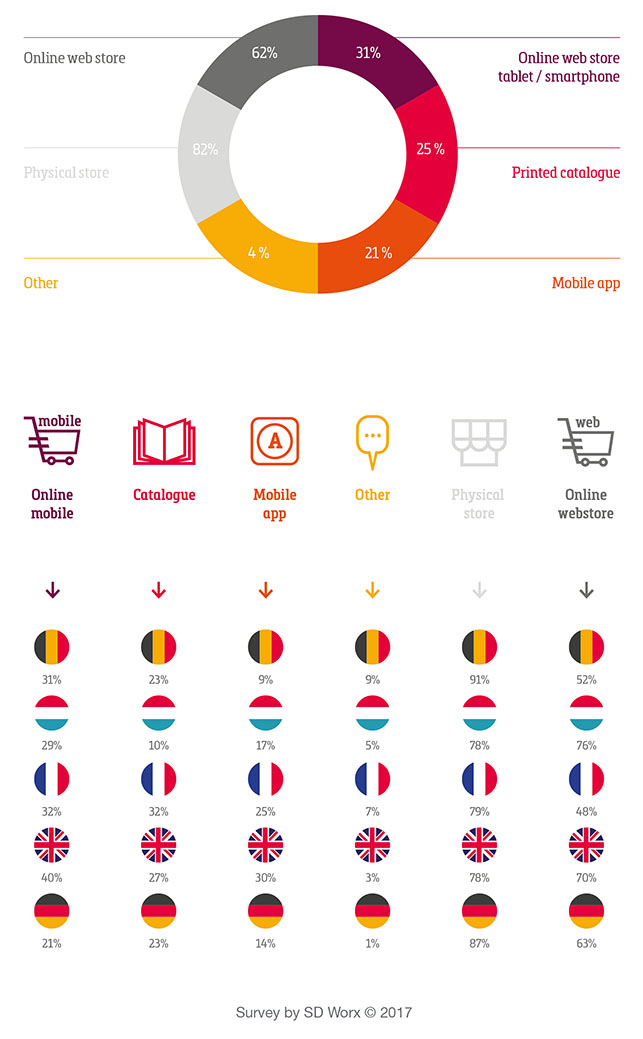It’s taken some companies a while to catch on, but an e-commerce strategy is now essential, according to fresh European research which finds that Dutch retailers are the trailblazers when it comes to having an online shop and British businesses are the first to grasp mobile shopping. Infographic shows the research results.
Retailers have grasped the need to deploy an e-commerce strategy as well as physical stores and have taken their offerings online with good results, according to research across Britain, Belgium, Germany, France and the Netherlands. HR service provider, SD Worx, polled some 500 retailers – having from 50 to thousands of employees – and discovered:
- Two out of three businesses have readily embraced e-commerce
- Dutch retailers lead the way with more than 76% having an online shop
- British retailers are the first to grasp the importance of going mobile; 40% have a mobile online shop
- Retailers witness a positive impact of e-commerce on sales and almost three out of four (70%) expect further growth
The survey also reveals that some businesses have embraced e-commerce quite recently: 70% did so only in the last five years. Six out of ten respondents are convinced that those who do not invest in e-commerce, will ultimately run into difficulties.

E-commerce has experienced strong growth in recent years, resulting in numerous challenges for the retail sector. But retailers have proved to be slower to switch to new technology than their customers. The sample reveals that 62% of retailers have an online shop.
Clothes and shoe shops are the pioneers, but DIY retailers barely use e-commerce at all. And the Netherlands is leading the way with more than 76% of Dutch retailers boasting an online shop. The UK follows in second place with 70% of retailers polled having an online shop. Of the countries surveyed, France scored the lowest, with 48%.
E-commerce strategy mobilises Brits
Online shops remain insufficiently mobile: only 31% are specifically adapted for smartphones. British retailers are the first to grasp the importance of going mobile; 40% have a mobile online shop.
Out of all the countries together, approximately one in five retailers have a dedicated app for their online shop (21%). There are notable differences between the countries: Belgian retailers are in the minority here (9%), while Brits take the lead (30% have a dedicated app).
Retailers report e-commerce’s positive impact on sales, with almost three out of four (70%) expecting there to be further growth. More than 60% reckon that those who do not invest in e-commerce will lose ground.
But ‘clicks-and-mortar’ is favourite
Although the traditional retail sector might feel increased competition from large e-commerce stores, shopping in a physical store remains important for customers. The majority of retailers are certain that the combination of a bricks-and-mortar store with an online offering is vital if they are to remain successful in the future.
For example, as Dieter Messner – general manager Europe at Esprit – commented on the findings: ‘We strongly believe in an omni-channel strategy where online and offline merge and where it’s all about the consumer’s experience and needs.”
He added: “In Belgium and The Netherlands, around 80% of our stores are omni-channel operational, offering services such as Click & Collect and Click & Reserve. By the end of this season, almost all our BNL stores will be on board. It’s a success. In Belgium, the results are even beyond our expectation: we were selling online 15 years ago, so we’ve built quite a lot of experience on this level.
“Nevertheless, Esprit keeps investing in physical stores and in training our staff to deliver an excellent service. In the end, it’s all about the consumer.’
Retail expert at SD Worx, Peter Van Ostaeyen, commented on a thriving e-commerce industry: “Retailers that bet on an omni-channel strategy and merge online and offline customer experience will triumph. Physical and online stores complement each other and intensify customer experience. Our sample indicates that only 60% of the retailers surveyed apply such an omni-channel strategy. So, there’s still a long way to go.”
Not surprisingly, the study also showed that online sales rise sharply in the run-up to the festive season. In Europe, they increased by 25% over November and December. As Protime CEO Peter S’Jongers commented: “Retailers can make huge efficiency gains through flexibly deploying staff as and where they’re needed. Big data analysis enables them to accurately predict where and when pressures will arise, ultimately providing the customer with an even better service.”
Read also:
How delivery options impact dropout rates for online retail
Are 7 interactions optimal for driving maximum basket revenue for retailers?





Leave your thoughts